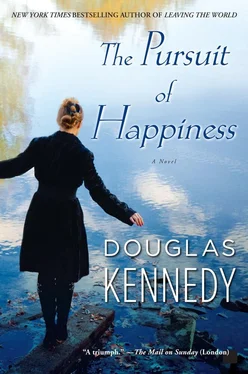'This isn't a popularity contest here. You're my much-adored brother. He's my much-adored guy. If it wasn't for me, you would never have known each other'.
'Yes', Eric said, 'you've got a lot to answer for'.
'I know, I know. And I can perfectly understand why you mightn't see eye-to-eye on...'
'Everything'.
'You're right, you're right. He's an Eisenhower Republican and you're a liberal Democrat. You're showbiz, he's a company man. You're an atheist, he's still a serious Catholic'.
'Not to mention a firm upholder of the seventh commandment'.
'You can't stop, can you? When in doubt, spring a one-liner'.
'Sorry, sorry'.
'Please, Eric - don't make Jack a battleground between us. It'll end badly'.
'It will never be mentioned again'.
To his infinite credit, it wasn't. Nor did Jack ever utter a further disparaging word about my brother. Nor did Jack's wife have another outburst about his divided loyalties (or, at least, none that he reported to me). In true nineteen-fifties style, we all simply let the matter drop. Back then, everyone did their best to avoid frank discussions about anything that was potentially painful. The urge to over-analyze was one that we all dodged. Better to say nothing - and to accept the fact that certain things just couldn't be fixed.
So a status quo developed between us all. I saw my brother at the weekends. I saw Jack during the week. His wife never asked about me. I always let Jack bring up the subject of his family. It was all very civilized, very polite, very workable. And I also discovered a useful ally - in the shape of Jack's sister, Meg.
After the scene in the St Moritz, I was deeply hesitant about being finally introduced to Meg, fearing that she might dislike me on sight, or simply disapprove of my role as the other woman in her brother's life. Jack himself also seemed disinclined to confess all to his sister.
'I need to find the appropriate moment', he told me. And though I knew what he was really saying - I'm scared to death of what she might say - I simply assured him that he should wait until the time was right.
So it was something of a surprise to pick up the phone one June morning at my apartment, around a month after I had first told Eric about Jack's re-emergence in my life, and be greeted by a sharp, sassy voice, identifying herself as:
'Meg Malone - the phantom sister'.
'Oh, hi there', I said, sounding a little hesitant.
'You sound nervous', she said.
'Well...'
'No need. Especially with a broad like me. You free for lunch today?'
'Uh, sure'.
'Good. One p.m. at Sardi's. One small thing: you do drink, don't you?'
'Uh, yes'.
'Then we'll get along fine'.
Despite Meg's assurances that I had no need to feel nervous about meeting her, I was still exceptionally tense when I walked into Sardi's that lunchtime. The maitre d' escorted me to 'Miss Malone's usual table' - a banquette, in a prominent position on the restaurant's central side wall. She was already there when I arrived - a cigarette in one hand, a gimlet in the other, a copy of the Atlantic Monthly open on the table in front of her. Unlike Jack, she was diminutive, yet pretty in an ageing-tomboy sort of way. As I approached the table, she looked me up and down with care. Then, as I sat down, she pointed to her copy of the Atlantic and said, 'Has the thought ever struck you that Edmund Wilson is completely full of shit?'
'Full of shit... or just plain fat and pompous?'
That comment garnered a hint of a smile. 'What are you drinking?' she asked.
'If that's a gimlet, I'll take one'.
'Sold', she said, and launched back into a diatribe against Wilson, Cyril Connolly, and all other would-be purveyors of literary criticism. By the time the second gimlet arrived, I was learning all about the internecine goings-on at McGraw-Hill. By the time lunch and the bottle of Soave arrived, she wanted to know everything about working for Saturday Night/Sunday Morning. By the time coffee showed, it was three p.m., we were both tight (in every sense of the word), and I was getting all the dirt on Meg's recent affair with a senior editor at Knopf.
'You know what I most like about married men?' she said, gesturing loosely with her wine glass. 'The fact that they think they are in control of the situation, whereas we're the ones with the real power. We can kick their ass out of the apartment whenever we're fed up with them. Of course, I'm a romantic about these things'.
'I can tell', I said, laughing.
'Jack always said that I inherited the cynical genes in the family. Unlike himself - who, despite the tough Brooklyn mick exterior, is so damn soft about everything. You should hear how he talks about you. As far as he's concerned, you're his salvation, his redemption from everything that has trapped him in life. When he first tried to tell me about you, he was so damn jittery, so apprehensive. Finally I cut him off and said, "For Christ's sake, Jack - I'm not Father Gilhooey. Do you love the girl?" To which he said, "More than anything." And... will you look at that... you're blushing'.
'Yes', I said. 'I am blushing'.
'Blush away. I'm just pleased for you both. As some guy in the Brill Building once wrote, "Love is a wonderful thing."'
'He was terrified of telling you'.
'That's because my brother is the worst kind of Irish Catholic. He really believes in Original Sin, Man's fall from grace, hellfire-and-damnation, and all the rest of that cheerful Old Testament crap. Whereas I told him, morality is bullshit. All that counts is a certain degree of decency between people. From what I gather, he's been pretty decent to Dorothy about the whole thing'.
'Maybe - but I sometimes feel guilty as hell about her'.
'Listen, he could have been a total bad guy and walked right out on her and Charlie. Face it, a lot of men would've done that. But he's loyal. Just as Dorothy's loyal. I mean, I've always thought that Dorothy was basically a decent woman. Not exactly sparky, or a laugh-a-minute, but fundamentally all right. So what if their marriage isn't about grand passionate love - he's got that with you. With Dorothy, there's a basic, working comradeship - and that's no bad thing. Most marriages I know are based on mutual loathing'.
'Does that mean you'll never get married?'
'I'd never say never. But, at heart, I think I'm cut out for the single life. I like a guy around... but I also like when he leaves'.
'I can sympathize with that position'.
'So you can handle being "the other woman"?'
'It is amazing, discovering how much you can actually handle in life'.
After this lunch, Meg and I became firm friends, and made a point of having a Girls' Night Out every six weeks or so. Jack was delighted that we'd hit it off so well... even though he was always a little worried about what we talked about during these boozy dinners. One night at my apartment, curled up against him on the sofa, he started giving me the third degree about my recent conversations with his sister.
'What we talk about is none of your business', I teased him.
'I bet it's all girls' talk', he said.
'Girls' talk! Here we are - a pair of professional women, Bryn Mawr and Barnard educated - and you imagine us trading recipes for brownies'.
'No - but I could see you talking about nail polish or nylons'.
'If I didn't know you were winding me up, I'd let you have it'.
'So come on - what do you talk about?'
'Your performance in bed'.
He turned white. 'Are you serious?'
'Totally. And Meg wants to know every last detail'.
'Jesus God...'
'Well, what else do you expect us to talk about?'
'You are joking, right?'
'Why are men so dumb?'
'Because we make the mistake of falling for smart cookies like you'.
'Would you rather a dumb cookie?'
Читать дальше












